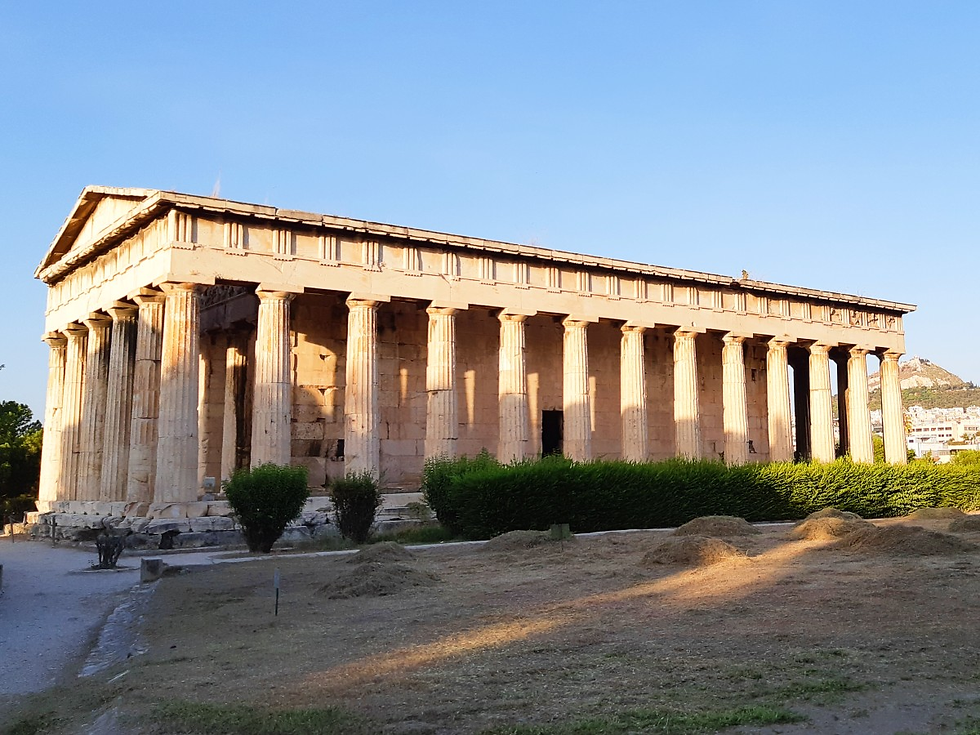Exploring the ruins and understanding their significance
- Johnny Ka
- Jul 31, 2023
- 3 min read
Updated: Aug 4, 2023
Introduction:
The ruins of Athens, Greece, are a captivating testament to the city's ancient past and the rich history of Western civilization. As you wander through the ancient sites, you can't help but be struck by the grandeur and cultural significance of these remnants of a bygone era. In this review, we will embark on a journey through time, exploring the ruins of Athens and unraveling their significance, shedding light on the historical and cultural tapestry that has shaped the city.
The Acropolis: A Symbol of Ancient Greek Civilization:
No exploration of Athens is complete without a visit to the Acropolis, a towering citadel that has come to symbolize ancient Greek civilization. Crowned by the iconic Parthenon, the Acropolis is a masterpiece of ancient architecture and a UNESCO World Heritage site. As you ascend the hill, you can marvel at the meticulously carved marble columns, the friezes depicting mythological tales, and the awe-inspiring panoramic views of the city below.

The Acropolis represents the pinnacle of ancient Greek art and culture, a monument to the achievements of Athenian democracy and the birthplace of Western civilization. Exploring its ruins allows us to appreciate the architectural genius and cultural legacy of ancient Athens.
The Ancient Agora - The Heart of Civic Life:
Continuing our journey, we arrive at the Ancient Agora, the vibrant marketplace and center of civic life in ancient Athens. Here, the echoes of bustling market activity and political discourse still resonate among the ruins. The Temple of Hephaestus, the Stoa of Attalos, and the remnants of the agora itself bear witness to the democratic ideals and intellectual pursuits that flourished in ancient Athens.

Exploring the Ancient Agora enables us to grasp the significance of this central gathering place, where citizens engaged in philosophical discussions, conducted business, and participated in the democratic process. It is a window into the daily life and social fabric of ancient Athens.
The Temple of Olympian Zeus - A Monument to Divine Power:
As we move further, we encounter the awe-inspiring Temple of Olympian Zeus, a testament to the grandeur and power of ancient Greek religion. This colossal temple, dedicated to Zeus, the king of the gods, showcases the architectural prowess of the ancient Greeks. Though partially ruined, the remaining columns provide a glimpse into the sheer scale and majesty of this once-magnificent structure.

The Temple of Olympian Zeus serves as a reminder of the religious devotion and the belief in the divine that permeated ancient Athenian society. Exploring its ruins evokes a sense of wonder and reverence for the spiritual significance bestowed upon these monumental structures.
The Theater of Dionysus - Where Drama Took Center Stage:
Moving to the Theater of Dionysus, we enter the realm of ancient Greek drama and artistic expression. Here, theatrical performances were held in honor of Dionysus, the god of wine and fertility. As we stand among the stone seats and imagine the ancient audiences immersed in the captivating performances, we gain a deeper appreciation for the cultural legacy of Greek theater.

The Theater of Dionysus serves as a reminder of the enduring influence of ancient Greek drama on the arts. It is a testament to the creativity and theatrical genius that flourished in ancient Athens, giving birth to the works of playwrights such as Aeschylus, Sophocles, and Euripides.
The Roman Agora - A Blend of Greek and Roman Influence:
The ruins of the Roman Agora provide a unique perspective on the interplay between Greek and Roman civilizations. This marketplace, built during the Roman period, incorporates elements of both Greek and Roman architectural styles. Exploring its remains allows us to observe the fusion of these two distinct cultural influences.

The Roman Agora stands as a testament to the Romanization of Athens, showcasing the enduring impact of Roman civilization on the city's urban landscape and cultural identity. It serves as a reminder of the historical connections between ancient Athens and the Roman Empire.
Conclusion:
Exploring the ruins of Athens is like embarking on a journey through time, unraveling the stories and significance of the ancient world. Each ruin holds a piece of the historical and cultural puzzle that shaped the city and influenced Western civilization.
From the grandeur of the Acropolis to the bustling marketplace of the Ancient Agora, the ruins of Athens invite us to step back in time and connect with the vibrant heritage of ancient Greece. They provide a tangible link to our collective past, reminding us of the achievements, ideals, and cultural legacy that continue to inspire and captivate visitors from around the world.




Comments